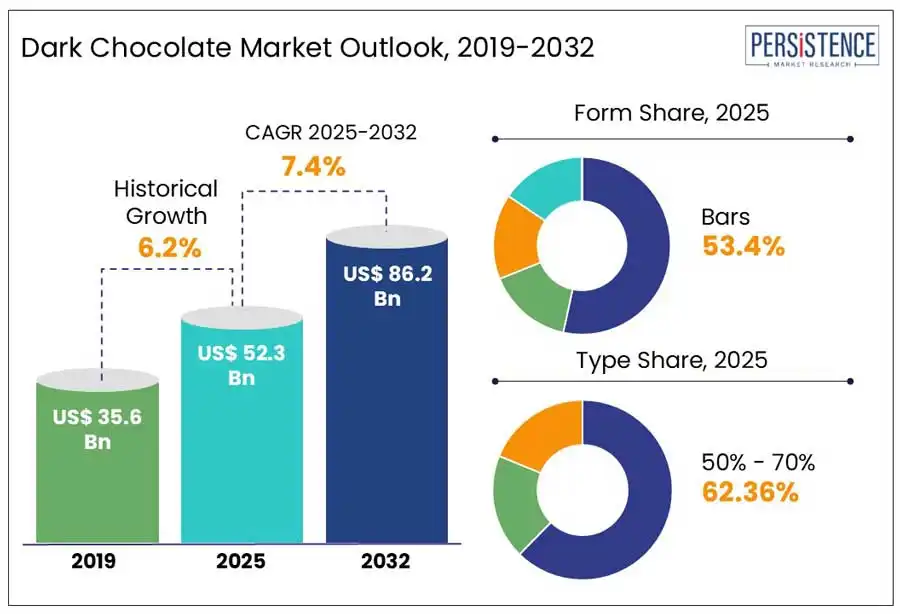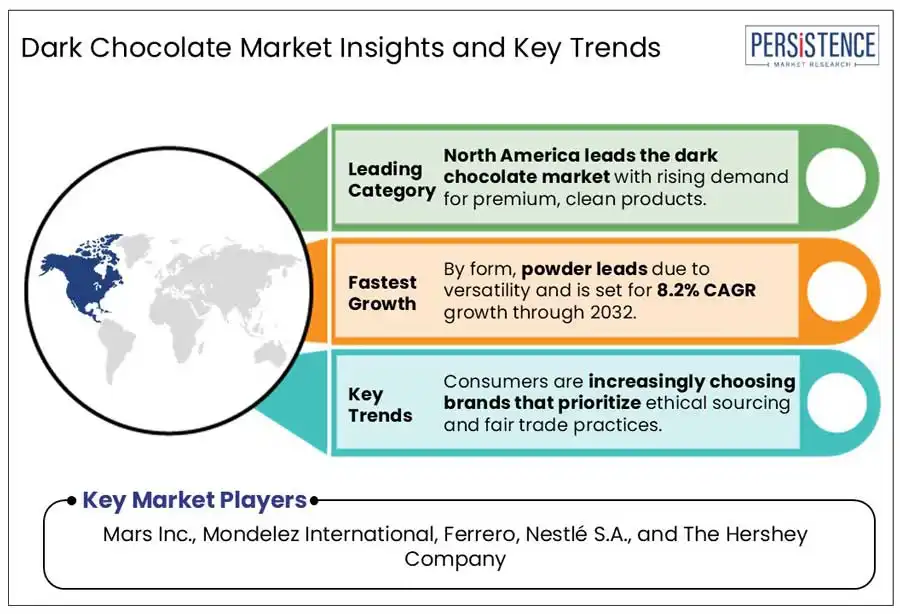ID: PMRREP22423| 190 Pages | 28 Apr 2025 | Format: PDF, Excel, PPT* | Food and Beverages

The global dark chocolate market size is anticipated to reach a value of US$52.3 bn in 2025 and attain a value of US$86.2 bn to witness a CAGR of 7.4% by 2032. Dark chocolate, often called ‘semisweet’ or ‘bittersweet’ chocolate, is made using cocoa butter instead of vegetable oils like coconut or palm oil. It contains a high amount of cocoa solids usually more than 60%, and contains sugar added in minimal quantities. This gives dark chocolate its strong flavor and deep color. It is rich in flavonoids, which are natural compounds that offer health benefits.
Dark chocolate is available in many forms, including bars, chips & chunks, blocks, and powder chocolate. Due to its health benefits, it is becoming more popular among consumers. Some benefits include reducing brain stress linked to aging, which may help delay conditions such as Alzheimer’s disease and dementia. The growing interest in health and wellness has had a big impact on the consumers. Several companies prefer using organic ingredients and natural sweeteners at manufacturing stages. From a consumer aspect, many people choose dark chocolate over milk chocolate since it is perceived as a healthier option.

Key Industry Highlights
|
Global Market Attribute |
Key Insights |
|
Dark Chocolate Market Size (2025E) |
US$ 52.3 Bn |
|
Market Value Forecast (2032F) |
US$ 86.2 Bn |
|
Projected Growth (CAGR 2025 to 2032) |
7.4% |
|
Historical Market Growth (CAGR 2019 to 2024) |
6.2% |
Growing global awareness of dark chocolate's health benefits significantly propels market growth. Dark chocolate is rich in flavonoids and polyphenols, it is associated with improved heart health, cognitive function, and reduced inflammation. A study by Harvard T.H. Chan School of Public Health found that consuming at least five servings of dark chocolate per week was linked to a 21% lower risk of developing type 2 diabetes.
This aligns with consumer trends favoring functional foods that offer health advantages. Manufacturers are responding by introducing products with higher cocoa content and natural sweeteners to meet health-conscious consumer demands. This shift underscores the impact of health awareness on market dynamics, driving innovation and expansion in the dark chocolate segment.
The dark chocolate industry is currently grappling with significant cost pressures due to the mounting prices of cocoa beans and other essential ingredients. As of early 2025, cocoa prices have surged to over $10,000 per metric ton. This increase is primarily attributed to adverse weather conditions, crop diseases, and underinvestment in key producing regions, such as West Africa which accounts for a substantial portion of the global cocoa supply.
The elevated costs of cocoa along with rising prices of other ingredients and packaging materials are compelling manufacturers to reconsider their pricing strategies and product formulations. Some companies reduce product sizes or altering recipes to manage expenses, which may affect product quality and consumer satisfaction. These cost challenges pose a significant restraint, potentially impacting profitability and limiting the ability of producers to invest in innovation and expansion.
In the evolving landscape of consumer preferences, there is a growing demand for sustainable and eco-friendly packaging solutions in the dark chocolate market. Consumers are increasingly prioritizing environmental responsibility, seeking products that align with their values. This trend presents an opportunity for chocolate manufacturers to differentiate their offerings by adopting biodegradable, recyclable, or compostable packaging materials. Innovative packaging not only reduces environmental impact but also enhances brand image and appeals to a broader customer base. Companies that invest in sustainable packaging solutions can capitalize on this shift in consumer behavior, potentially gaining a competitive edge in the market.
Moreover, aligning packaging strategies with environmental concerns may lead to increased customer loyalty and open up new market segments focused on sustainability. Embracing eco-friendly packaging is a response to consumer demand and a proactive step towards long-term environmental stewardship and business resilience.
Bars continue to dominate the form segment due to their widespread popularity and convenience. They are the most consumed form, offering a range of options from premium to mass-market varieties. Consumers often prefer dark chocolate bars for their rich taste, versatility, and easy availability in retail stores. Their strong presence is bolstered by brands offering innovative flavors and packaging that cater to evolving consumer preferences.
Meanwhile, the powder segment has emerged as the fastest-growing. This growth is driven by increased consumer interest in health-conscious products and versatile cooking ingredients. Dark chocolate powder is becoming popular for beverages, baking, and cooking, as it offers a convenient way to relay health benefits of dark chocolate. This trend is particularly evident in regions where wellness and fitness trends are gaining momentum.
Supermarkets, hypermarkets, and convenience stores offer a wide range of dark chocolate brands and variants, making them the preferred shopping destinations for consumers. These outlets provide attractive shelf displays, promotional deals, and better product visibility, which help drive impulse purchases and brand recognition. Additionally, the structured retail environment ensures product availability, consistent quality, and trust among buyers.
Consumers often value the convenience of one-stop shopping and the ability to compare various products in person, which modern trade outlets effectively provide. These retail formats also allow brands to conduct in-store marketing activities such as tastings and promotional events, further encouraging product trials. As a result, modern trade continues to capture a significant share of dark chocolate sales, particularly in urban areas where consumer access to organized retail is steadily increasing along with disposable incomes and lifestyle changes.

The North America dark chocolate market is witnessing strong growth, driven by evolving consumer preferences and rising health awareness. Most consumers enjoy chocolate one to two times per week, reflecting a steady and moderate consumption trend. Only 12% of the population consumes chocolate daily, while 11% indulge only a few times per year. Around 72% of Americans perceive chocolate as a part of a happy, and balanced lifestyle.
This perception supports the growing demand for dark chocolate, which is often chosen for its higher cocoa content and associated health benefits, such as antioxidants and lower sugar levels. Consumers are increasingly seeking clean-label, organic, and ethically sourced options. Premium dark chocolates that align with wellness trends and sustainability are gaining traction. These factors combined with innovation in flavors and packaging, are expected to keep a steady market growth in the coming years.
The European dark chocolate market is experiencing steady growth, driven by increasing health consciousness among consumers. Consumers are increasingly aware of the health benefits associated with dark chocolate, such as improved heart health and cognitive function, leading to a preference for high-cocoa content products. This shift is further supported by the rising demand for premium and organic dark chocolate options. However, the industry faces challenges due to soaring cocoa prices, which have reached record highs, impacting production costs and leading to price increases for consumers. Despite these challenges, the market continues to innovate with manufacturers focusing on sustainable sourcing and introducing products with added health benefits to meet evolving consumer preferences.
Switzerland is globally renowned for its premium chocolate. Swiss consumers have one of the highest per capita chocolate consumption rates with a strong preference for high-quality and artisanal dark chocolates. Additionally, Germany is one of the largest chocolate markets in Europe, both in production and export. German consumers increasingly prefer dark chocolate for its health benefits and lower sugar content.
The dark chocolate market in Asia Pacific is growing steadily, driven by shifting consumer tastes and rapid urban development. India has emerged as the fastest-growing market in the region, fueled by rising income levels and a large, youthful population. The demand for premium chocolate offerings is increasing, especially in urban centers. This expansion is further supported by the launch of new and innovative product varieties by chocolate manufacturers.
In China, consumers express interest in imported dark chocolate products. The expansion of retail channels and e-commerce platforms has made dark chocolate more accessible to a broader audience in the region. Manufacturers focus on innovative packaging and flavors to cater to diverse consumer tastes.
Leading players in the dark chocolate market are increasingly focusing on innovation and efficiency to stay competitive in a dynamic landscape. Companies such as The Hershey Company, Mondelez International, Barry Callebaut, and Nestlé SA are investing heavily in the development of cost-efficient production methods that streamlines manufacturing and reduce environmental impact. This strategic shift is essential as raw material costs, especially cocoa, continue to rise globally.
Additionally, these manufacturers are exploring new application areas such as functional foods, nutraceuticals, and health-focused products to cater to evolving consumer demands. Penetration into emerging markets and premium product segments also represents a significant growth opportunity. Players like Ferrero, Ghirardelli, Unilever, and Mars Incorporated leverage their global reach and brand value to introduce innovative dark chocolate variants with unique flavors, clean labels, and sustainable sourcing. This multi-faceted approach ensures long-term growth and relevance in the competitive global market.
The global market is estimated to increase from US$ 52.3 billion in 2025 to US$ 86.2 billion in 2032.
Rising demand for premium products, clean-label trends, and increasing awareness of organic, vegan, and ethical sourcing.
The market is projected to record a CAGR of 7.4% during the forecast period from 2025 to 2032.
Some key players are Mars Inc., Mondelez International, Ferrero, Nestlé S.A., and The Hershey Company.
Expansion in emerging markets, functional chocolate innovation, rising gifting culture, and growing preference for high-cocoa, and sugar-free formulations sum up as market opportunities.
|
Report Attribute |
Details |
|
Historical Data/Actuals |
2019 - 2024 |
|
Forecast Period |
2025 - 2032 |
|
Market Analysis Units |
Value: US$ Bn, Volume: As applicable |
|
Geographical Coverage |
|
|
Segmental Coverage |
|
|
Competitive Analysis |
|
|
Report Highlights |
|
|
Customization and Pricing |
Available upon request |
By Form
By Type
By Application
By Sales Channel
By Region
Delivery Timelines
For more information on this report and its delivery timelines please get in touch with our sales team.
About Author